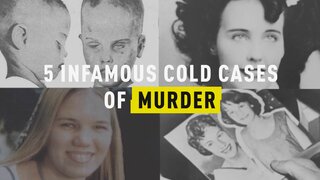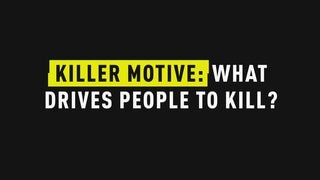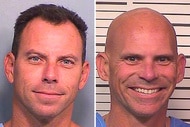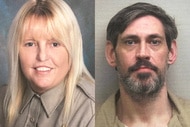Create a free profile to get unlimited access to exclusive videos, breaking news, sweepstakes, and more!
Man Wrongly Convicted In 'Doppelgänger' Case Seeks Seven-Figure Settlement
Crooks concoct wild lookalike stories all the time — but this one turned out true.
A innocent Kansas man freed from prison last year after wrongly serving 17 years in prison for a robbery committed by his doppelgänger is suing the state for compensation.
Richard Jones filed a petition on Wednesday in a Kansas state court asking for official recognition of his innocence, so that he can “obtain the clean slate and financial support that the Legislature intended for wrongfully convicted persons,” according to the Kansas City Star.
Jones, now 42, was convicted of robbing a woman in a Walmart parking lot in 1999, but in June 2017 the conviction was overturned and he was released from prison after evidence emerged showing that a man who looked nearly identical to Jones had committed the crime, the Star reported.
At Jones’ 1999 trial, the evidence against him was based entirely on eyewitness identifications. While Jones presented alibi witnesses who testified he was with them on the day of the crime, a Kansas jury found him guilty.
Jones was sentenced to 19 years, and his subsequent pleas for a fresh look were repeatedly denied.
“I filed every appeal possible on my case,” Jones told the Star in 2017. “Exhausted all my remedies. They denied every last one of them. The Supreme Court denied every last one of my appeals. Even appeals that I had merit in.”
Then, in 2015, other prisoners at the Lansing Correctional Facility — where Jones was serving his sentence — began mistaking him for another inmate, Ricky Amos, according to the University of Kansas School of Law Project for Innocence, which represented Jones.
Jones shared the revelation with his attorneys, who obtained a mugshot of Amos and brought it to the prison, where they showed it to the wrongly convicted man.
“I saw that picture, man, and when I saw that picture it just made sense to me,” Jones said.
“They looked like they could have been twins. From there, other pieces of the puzzle began fitting together,” said Chapman Williams, one of the attorneys representing Jones.
Digging deeper, Jones’ lawyers found that Amos had lived in the Kansas City area in 1999 and had been associated with the address where the real crook had been picked up by accomplices before the robbery.
The lawyers showed their new findings to the robbery victim and another witness, both of whom identified Jones at first, and showed them photographs of Jones and Amos side-by-side.
They couldn’t tell the two apart.
“I am no longer certain I identified the right person at the preliminary hearing and trial,” Tamara Scherer, the victim, said in a court filing supporting the reversal of Jones’s conviction. “If I had seen both men at the time, I would not have felt comfortable choosing between the two men and possibly sending a man to prison.”
At a June 2017 hearing, Jones’ attorneys presented testimony from Scherer and other witnesses, who testified that looking at pictures of the two men together, they were no longer certain that Jones had been the robber.
Kansas Judge Kevin Moriarty threw out Jones’ conviction and ordered his release from prison, but stopped short of calling him innocent, stating only that based on the new evidence, no rational jury could find him guilty. Prosecutors said they would not file new charges.
In the petition filed Wednesday, Jones’ lawyers ask for a declaration of innocence, arguing that he meets the state's legal criteria to receive compensation for wrongful conviction and imprisonment.
“It is hard to imagine how Mr. Jones can truly get a fresh start without the assistance sought, having lost so many years behind bars when he could have been getting an education, developing his skills, and pursuing and rising within his chosen profession,” the lawyers wrote.
The petition asks that Jones be awarded $65,000 for each year of his incarceration, for a total of $1,117,466. It also requests compensation for tuition, housing assistance, counseling, attorney’s fees and other costs associated with the case of mistaken identity.
“This compensation is relatively small given the unfathomable hardship of seventeen years of wrongful imprisonment,” the petition says.
[Photo: Ricky Amos (l.) and Richard Jones (r.) / Kansas Dep’t of Corrections]



























